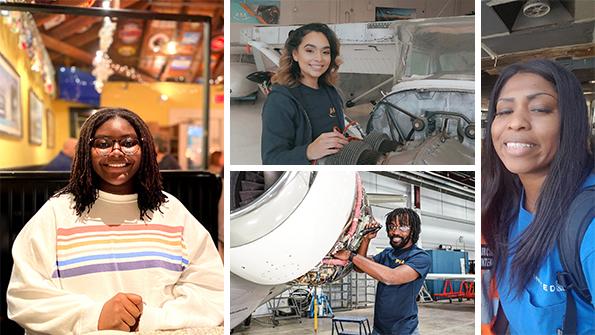Aviation Maintenance Students On Challenges Facing Next-Gen Workforce

The current crop of students working toward careers in the MRO industry have faced unprecedented challenges in the form of the novel coronavirus pandemic and social unrest. With COVID-19 vaccinations ramping up and industry recovery on the horizon, job prospects are improving for next-generation talent. However, hurdles remain—particularly for women and people of color. Inside MRO spoke with aviation maintenance students from across the U.S. to learn their perspectives on career opportunities and diversity and inclusion in the aviation industry. Here are some responses from a few of the students.
Inside MRO: How do you think the aviation industry can do a better job of both connecting with and attracting underrepresented populations to the workforce?
Vanessa Vowotor: I think the industry is doing an amazing job representing different people and the talents they hold. However, improvements could be made in hiring more international talent into the workforce. International students often do not get the same recognition and representation as American students do. Companies should encourage more international students to apply through hosting online seminars, sharing the type of talent they would be looking for and giving recommendations on how to improve themselves in college.
Luz Gonzalez: A lot of people just don’t know about the aviation industry itself. A lot of people are closed-minded [and focused on] being safe rather than sorry instead of stepping outside of their comfort zone and taking that risk to go for that career.
When someone has curiosity about the field of aviation, their first thought is to enlist in the Air Force. But if they only knew, there is another course for furthering their education in the study of aerospace. During this time, the airline industry can become better at connecting cultures through people. People don’t know [about aviation maintenance careers] unless someone tells them about the opportunity. When one works hard to create the path to give others hope, that is when the attraction of workmanship plays a big role.
Jimulia Johnson: I think the aviation industry can do better by networking with the airline industry to offer programs that will attract people who want to pursue a career in aviation but are intimidated by expectations that they feel they don’t meet or qualify for.
What has it been like studying aviation maintenance during the COVID-19 pandemic? Have there been any unique challenges?
Vowotor: COVID-19 has caused a lot of changes to several industries, especially aviation. Adaptability has been key throughout this pandemic. Here at Embry-Riddle, we are grateful to have the technology, equipment and space to adapt and continue classes and lectures with only minimal impact on learning. The professors have done an amazing job of moving lectures online while still meeting the FAA’s requirement for contact hours and in-person labs. I currently work in the Embry-Riddle Repair Station, and my colleagues and I work to keep everyone engaged as well as following CDC guidelines on social distancing and masks.
Gonzalez: As far as the school’s operation, they have hybrid classes, meaning some days we’re online and some days we’re in class. But [the challenge is that] mostly we need to be in class because we can’t take an engine home and study it; so we have to be in class to get that hands-on experience. Another challenge is trying to keep the mask on and the 6-ft. distance. The class size has been mostly less than 20 people. Generally, they divide class time between morning and afternoon.
Ron Worthy: We had a break where we basically didn’t go to school for about three months. We had to switch to virtual learning. Our school is more of a kinesthetic learning [environment], so you have to have hands-on training, as we have engines and jets there that we actually need to work on. As far as COVID, it was pretty hard going through those three months trying to learn things virtually, because you couldn’t actually see things and work on them.
Johnson: I take the bitter with the sweet regarding this pandemic. It has been a blessing and a curse at the same time. For example, it was a struggle driving from the northwest suburbs to the south suburbs [of Chicago] and then, once I got out of class later on in the evening, driving to O’Hare Airport and barely making it to work on time. Also, I miss seeing my friends and instructors at school. We had so much fun on campus while learning to become future mechanics, and I miss the campus food, too. Other than that, the online classes have been phenomenal in terms of resources and the materials needed to complete the course assignments. The teachers are amazing!
Given the pandemic’s severe effects on the aviation industry, are you concerned that aviation maintenance is no longer a stable career path?
Vowotor: Airplanes will always need maintenance. Maintenance technicians will always have a job to do even if airplanes are not flying because [they] are machines that need routine maintenance to keep them in good condition.
Worthy: People will always need aviation. People will always need to travel, regardless of whether there’s COVID or not. Some people need to travel in order to go to work. So I wouldn’t call it a dying business, but it has just slowed down.
It didn’t really affect me because during COVID I was still in school. Actually, it’s a perfect time for me to go back [into the workforce] now that people are starting to hire and COVID has been going down; so it really didn’t have that much of an effect on me. If anything, the people that [the industry] lost, they’re bringing back now.
Johnson: I have been down this road before while working in aviation. However, aviation will bounce back eventually. One thing I know is that people love to travel.
The aviation industry tends to skew heavily toward a white, male workforce. From your experiences so far, has this created any challenges or barriers in pursuing your career?
Gonzalez: In the majority of my classes, I’m the only female. Being the only female, I wouldn’t say it gives me pressure; it gives me a better opportunity to try to get the best out of it. It all depends on one’s behavior and mindset.
When constructing an aircraft project, the parts of the structure come from all over the world and are sent to a manufacturer station to be put together by the engineers and mechanics. Along with the materials that arrive from other regions of the world, we have to consider not only the parts of the aircraft but also the people functioning in unity to construct it. Diversity is mandatory in all aspects of the workforce—it has a genuine competitive advantage when it comes to different people with dissimilar perspectives, viewpoints and background knowledge. We need diversity of thought, voice and mindset at the table to bring those viewpoints that one person can’t see on their own.
Johnson: There are many challenges in the world regarding jobs that are skewed heavily toward white males. But knowing this, change has come. Women are on the rise in pursuing careers that were not an expectation from a male point of view until now. With this in mind, this is our time. It’s my time to shine and show little girls and other women that they, too, can accomplish anything they put their mind and heart into.
Are you involved in any student groups on campus working toward improving representation of diverse populations in science, technology, engineering and mathematics (STEM)?
Vowotor: I am currently involved in a campus club called the Society for Aviation Technicians, and every year we participate in the Aerospace Maintenance Competition hosted by MRO Americas. Last year, I was grateful to be a member of Embry-Riddle’s first all-female team, which was a huge achievement. Unfortunately, due to the current situation, the competition was canceled, but learning and training with those ladies was an experience I will never forget.
Do you think the aviation industry needs to embrace emerging technologies to attract younger generations to the workforce?
Gonzalez: Yes, definitely. From 2012 to 2021, there has been a dramatic change in technology. Even little kids today now use technology, so by the time they’re up in their career, technology is going to go beyond our imaginations. I truly believe that companies are moving toward more technology [and away from] paper and pencil.
What have been the biggest challenges or barriers in pursuing your career so far?
Worthy: One barrier has been a hiring freeze due to COVID for quite some time, but it was during the time I was in school. Now that I’m out of school, you really don’t see it as much as you would think.
The most difficult thing would be breaking down barriers, of course. Aviation is probably about 90-95% white, and there’s a lot of things you have to go through as far as just being able to deal with being a minority. It’s pretty rough, but I know how to push through things. I’ve experienced that throughout my whole life, so I learned how to try to deal with it. But it can be nerve-racking.
Aviation Maintenance Students
Vanessa Vowotor
A senior at Embry-Riddle Aeronautical University studying aviation maintenance science, with a concentration in safety and accident investigation and a minor in avionics line maintenance, Vowotor, who is originally from Ghana, was inspired to study aviation by her father, a safety inspector for the Ghana Civil Aviation Authority. She is set to graduate in the fall of 2021 and plans to begin her career working for a large MRO provider. She hopes eventually to work in various positions within the technical operations field.
Luz Gonzalez
During the pandemic lockdown, Gonzalez reexamined her planned career path of becoming a dentist. She came upon the opportunity to pursue aviation and decided to step out of her comfort zone to follow a new passion. She began studying at the Aviation Institute of Maintenance Norfolk in Virginia in July 2020 and plans to graduate in 2022. Post-graduation, Gonzalez wants to spend a few years working on the technical side of the industry before pursuing her pilot’s license and potentially exploring a career in the space segment.
Ron Worthy
A very recent graduate in aviation maintenance technology from the Pittsburgh Institute of Aeronautics—he graduated March 30 with an airframe and powerplant certification—Worthy hopes to become an aerospace engineer someday. At age 19, he had the opportunity to work at NASA’s Kennedy Space Center, where he was able to watch rocket launches and perform demolition work on a gravity chamber, which sparked his interest in aerospace.
Jimulia Johnson
A senior at Lewis University in Romeoville, Illinois, studying aviation business management, Johnson was born and raised in Chicago and has a long-held passion for aviation. She has spent years working in the airline industry and currently works in ramp service for United Airlines. She plans to pursue a career as an aircraft mechanic at United when she graduates in May 2021.





